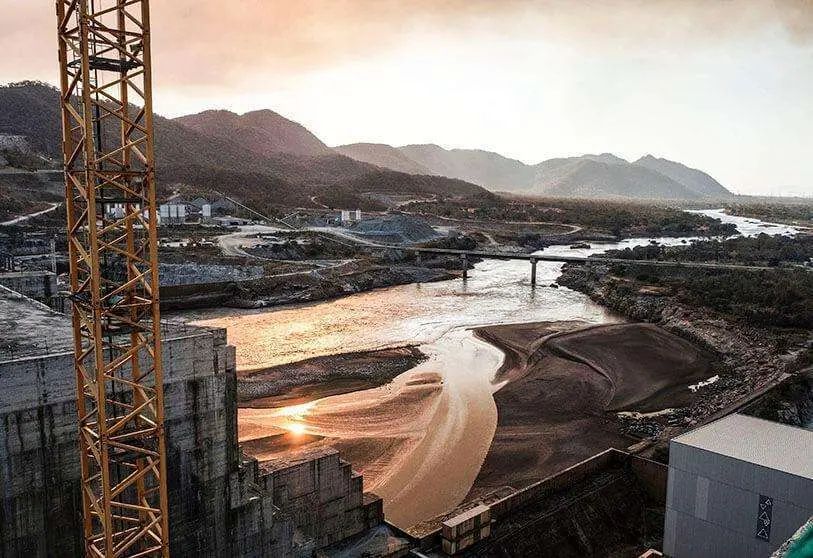Egypt-Ethiopia: the water war

The world's largest river along the Amazon covers one-tenth of the African continent and its waters are almost sacred in the land of the pharaohs.
Two years ago, the Egyptian singer Shirin was sentenced to six months in prison for having said during one of her concerts "Machrebch men Nilha" (I don't drink water from the Nile), warning against schistosomiasis, a parasitic disease that plagues the river. But the Nile is not a joke in Egypt and the singer paid dearly for her bottle of mineral water and her mistrust of mineral waters.
This story is not an anecdote and it is in the light of this introduction that one could understand in what state of mind, Egypt is negotiating Ethiopia's share of the waters of the Nile. The Renaissance Dam is a titanic project dreamt up by Ethiopia's neighbour and has become a tangible and threatening reality for Cairo.
Egypt's monopoly on the Nile is becoming ancient history. Stretching over 1780 metres and culminating at 155 metres, the Ethiopian dam is enough to make people jealous. However, it is far from dethroning the Aswan Dam built under Nasser and stretching for almost 4 km. But Addis Ababa's ambitions overshadow its Egyptian neighbour.
In 1929, Cairo and Britain signed a treaty granting highly favourable water quotas to Egypt and Sudan, which together accounted for 87% of the river's flow. As a result, Egypt had a veto right. A privilege which was abolished by the 2010 agreements ratified by the Nile basin states. The end of Egyptian hegemony allowed Ethiopia to develop its agricultural sector and become the largest African country in terms of electricity supply.
But Egypt is concerned about the fall in water levels downstream and has reason to be. Because the Nile is capricious and if it can overflow and flood its banks in times of flooding, this river that flows through the desert loses 10% of its water. The White Nile is fed mainly by rainfall from Ethiopia and the waters of the Blue Nile evaporate mostly in the Sudan, but the Nile remains sealed off: Egypt!
Five years ago Egyptian President Al-Sissi said "the dam will not divide us, Ethiopia has the right to aspire to development just as Egyptians have the right to live on the banks of the Nile". But since last July, Ethiopia has started to fill the dam and Egypt is raising its voice.
The schedule for filling the dam is at a complete standstill and at the head of Ethiopia a woman of strong character does not want to be intimidated by her neighbours. Egypt, which had requested the mediation of the United States for the negotiations and which wanted "a guaranteed minimum of water, a slower filling of the reservoir to avoid shortages, especially in the event of drought, as well as the presence of its experts on the spot", saw its requests rejected by Addis Ababa. Although the words of Cairo and its counterpart have been harsh recently, no military intervention seems conceivable for the time being.
The dam, which holds back Nilotic waters and is described as the second largest in Africa in terms of volume, has cost barely 15 percent of the country's GDP. The project that was awarded (without a tender) to the Italian Salini Costruttori cannot be the announced mastodon. It is expected to operate at only 30% of its capacity, and within the country voices were raised (and immediately silenced) to denounce the cost of the structure, whose dimensions were based on the flow of the Nile during the rainy season and not on its annual average.
Does the country really need this giant dam? Nothing is less certain. But what is clear is that Ethiopia intends to enlighten its populations in the most remote areas (65% of Ethiopians do not have access to electricity) and diversify their income, which currently depends on its coffee exports (the main coffee producer in Africa and the third largest supplier of Arabica in the world).
It is clear that no one is in a position to dictate to Ethiopia what it wants to do. The country claims to be sovereign and "no force could stop Ethiopia from building the dam," said Ethiopia's Prime Minister Abiy Ahmed. A drop in the water level of the Nile could affect river transport in Egypt and create water stress in the country, whose river is the main source of water.
What is at stake between Egypt and Ethiopia is not just a question of water supply, the country of Al-Sissi is struggling to renounce its hegemony in the region and its former privileges. Ethiopia, which has suffered food crises, wants to mark a turning point in its history and economy, and a renaissance seems imminent.

